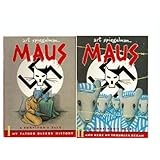I have been carrying these graphic novels (Maus I: My Father Bleeds History and Maus II: And Here My Troubles Began) around for the past few years waiting for the right time to read them. I thought that after Animal Farm and Lord of the Flies (where I think a common essential question is: How could people do this to each other?) they might be a good place to find some materials that helps answer that essential question in a different way. I am kind of a genocide weirdo. Sitting in an undergraduate class talking about the Rwandan genocide, a classmate said, "I can't believe it! I remember learning about the Holocaust in school and thinking, that was a bad idea, good thing we don't do that anymore, but we do? We still do it?" and I was doing my very superior eye roll and decided I never wanted to be the girl people were rolling their eyes at superiorily in this field. I went on a genocide-story-reading kick, went to a conference on teaching the Holocaust, saw Gerda Weissman Klein speak (while clutching my best friend's hand and sobbing together. If you read ONE Holocaust book, read All But My Life. It has the happiest ending a Holocuast book can have), and then proceeded to burn out on genocide and need a break from everyone dying.
These graphic novels are the end of that break. First, the art is great. I really dig the black-and-white style, it reminds me of Persepolis in the best way (although it came first). The animal species for people totally makes sense, especially with all the "Jews are vermin" propaganda that was everywhere. Jews are mice, Poles are pigs, French are frogs, Germans are cats, and Americans are dogs. (For the record, this is something that some people find VERY offensive. I read some of the low-star reviews on Amazon because I couldn't imagine how someone could NOT like these books, and apparently they find the Polish pigs and American dogs to be terrible ways to portray all the good Americans and Polish people.) The story is a Holocaust story, but the author's father, Vladeck, is such an interesting and unique person, both as an older man in the 'current' part of the frame story and as a young man in the flashback part of the story. The way he manipulates situations in order to come out of the Holocaust alive is truly impressive and creative.
The structure of the story - a frame story where AS is IN the story surrounding the flashbacks while he visits with his father to GET the story - works well for many reasons. It's fun because it gets meta (the mouse-author has a conversation with his French-converted-Jewish wife about what kind of animal she should be, or at one point the cartoon author runs away to take notes on the conversation that we just saw). It also works because AS asks his father many of the questions that people ask about the Holocaust: why didn't anyone fight back? why were some Jews complicit and working with the Nazis? what happened to the people who weren't? why didn't you do x, y, z? and his father addresses all of his concerns. At the how-to-teach-the-Holocaust conference I attended, we spent a lot of time discussing how to talk to students who are unsympathetic and feel like they would have 'done something different.' Ultimately, the Holocaust was about people being forced to make IMPOSSIBLE choices.
In this book, parents are trying to decide whether they should send their child away with X family to hide. They are too afraid to be away from their child, so they do not. Later they are given the chance to send their child away with Y family to hide. They are too afraid to stay with their child, so they do. X family survived, Y family (and the child) did not. Two impossible choices with absolutely NO WAY to know which was going to be the right choice. Over and over in this book we see people die and people survive and there is so little that separates the survivers and the dead besides just dumb luck.
This is an absolute recommended book - it did not win the Pulitzer for nothing after all - but if a teacher were ever going to teach anything about any genocide, I think there are many panels from here that could be pulled to teach that will help grab more students' attention.


No comments:
Post a Comment